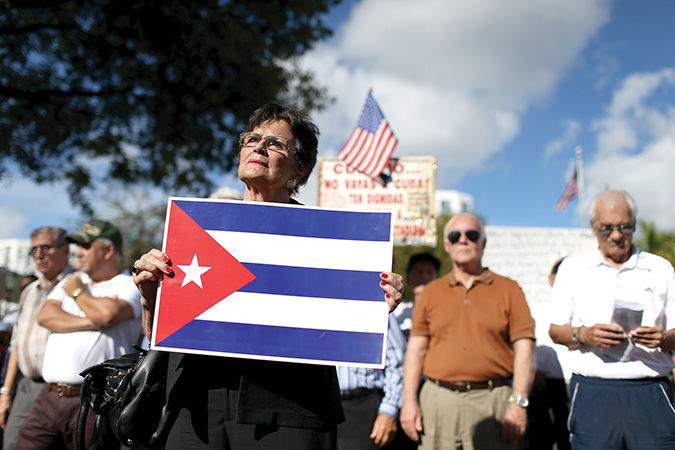Priests and women religious of the Archdiocese of Los Angeles welcomed the recent announcement made by President Barack Obama of the abandonment of a half-century of embargo and reestablishment of diplomatic and economic relations with the government of Cuba.
“After 54 years of sanctions it is a major change to decide to restore our relations with Cuba,” said Father Michael Barrett, theology consultant to Archbishop José Gomez. “It is something historic and we have to see how it unfolds. We see that it is time for a change and this may open up a way that persons in the country [Cuba] might become more open to the rest of free society.”
Jesuit Father Allan Figueroa-Deck, professor of theological studies at Loyola Marymount University, who served as the first executive director of the Secretariat of Cultural Diversity in the Church of the United States Conference of Catholic Bishops, thinks the “change of tone” is a result of the “Holy Spirit’s presence in us.” He added that the “opening toward Cuba is part of a bigger picture” of a “culture of encounter that Pope Francis is insistently proposing for the Church as well as for all of humanity. He is promoting an astonishing change of tone not only in the Church but even in the wider world.”
Father Michael Barrett echoed that statement.
“Pope Francis is interested in helping souls, especially our brothers and sisters in what was a Catholic country before [Fidel and Raul] Castro’s regime,” he said. “Regardless of politics, Pope Francis is a pastor trying to better lead the Cubans toward God and well-being, as he does for all souls.”
“Many Catholics in the United States did not know about the position of the last four popes, which was clearly against the U.S. embargo,” said Father Figueroa-Deck, a recognized writer and speaker on Hispanic Catholicism, faith and culture. “The Vatican always had an approach that sought to engage Cuba, not isolate it.
“The Catholic Church in the U.S. has a long history of supporting the Church in Cuba. This should continue and even intensify as long as the U.S. Catholic community, including the Cuban community in the U.S., respect the particularity of the Church in Cuba and allow the local church there to take the lead in establishing an appropriate pastoral vision and plans.
“The change in atmosphere will hopefully contribute to an experience of reconciliation and healing among Cubans and Cuban Americans in Southern Florida and in Los Angeles and other places throughout the country as well,” commented Figueroa-Deck. “For too long have these groups experienced fear and suspicion in their relations and allowed anger and bitterness about the past to influence and control their lives.”
Father Paul Griesgraber, pastor of Reseda’s St. Catherine of Siena Parish and an immigration activist, concurred.
“Because we have lived in separation, we have adapted to separation, with each one building the life of their own, but each nation can bring to the table ideas of reconciliation and change gracefully, with new values, investments, leaving behind the fear and resistance,” he said.
“This is about God, about love. It’s a big adventure, and again, it’s about crossing frontiers,” added the priest, who is a member of an archdiocesan immigration clergy committee that invests time seeking practical approaches to helping and supporting immigrant families and keeping them united regardless of their economic or legal status.
“This is an amazing event,” said Sister of the Holy Child Sheila McNiff, principal at St. Catherine of Siena School and immigration and workers’ rights activist.
But for Father Modesto Perez, a Cuban-born priest and practicing lawyer who pastors St. Elizabeth Church in Pasadena, the announcement of the new policy comes with mixed feelings.
After leaving Cuba at the age of 11, Father Perez returned at 42 to give talks on Canon Law and Marriage to priests, religious and lay leaders. Perez said it was “heartbreaking to see the conditions that people lived under and the daily humiliation of their human dignity, which have led to a daily, morally questionable struggle just to survive,” citing theft and prostitution as examples.
On the plus side, Father Perez said he is pleased with the decision taken by both governments.
“At least from the perspective of living conditions things can only improve,” Father Perez said. However, this improvement has implications. “In the last couple of days people have told me they’re happy because they can now vacation there [in Cuba]. I’m sorry, but having seen people’s struggle — people who don’t have access to the many elegant resorts built by the government — I find it somewhat offensive and insensitive.”
He hopes the Vatican helps keep alive the strong sense of patriotism of many Cubans who could have left the country, but stayed out of love for their country and Church.
“I met with lay people, priests and religious in Cuba, truly heroic individuals. I hope the Vatican will continue to speak on their behalf and to push for religious and political freedom,” he said.
“One of them told me as I prepared to leave, ‘Father, I must tell you, I rejoice whenever I meet someone like you, who has been able to pursue their dreams. But, I must confess, I also feel melancholic. I had multiple opportunities to leave, but I love my country and I love my Church and I decided to stay; and, if I had to, I would do it all over again. Yet, it hurts me when my children tell me that because of me they do not have a life or a future,’” the priest recounted.
“If Cuba and the Cuban Church has a future, it will be because of men and women like him!” he said. “I pray that Pope Francis will make sure their sacrifice has not been in vain.”

